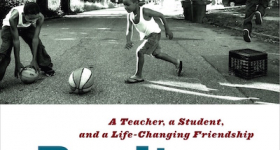West Side Recycling was a windowless cavern of abandoned metal and purchased recyclables. It was painted in three fat stripes of red, white and blue that encircled the squat building. In the distance, Griffith Park’s hills looked like a movie backdrop: crisp, never-ending, ready to swallow. The strip of sidewalk in front of the building was often filled with people dividing recyclables into aluminum, glass or plastic.
My parents sorted cans while I watched my little brother and did homework. We parked ourselves on the sidewalk, next to my parents and their shopping carts filled with cans. On hotter days, we tried to make ourselves as small as possible to fit under the shade of their can piles, the sun creeping back onto our skin as the heaps grew smaller.
I looped a finger through my brother’s hand and tugged gently when his grip tightened until his face broke into a laugh. We could play this game for hours until our parents were ready to have their recyclables weighed. My help was always more of a nuisance, and I was left to adventure inside, where the sticky sweetness of soda clung to everything. My sandals slapped at the floor with each step.
A weigh station at the entrance determined everyone’s fate for the day. Large bins filled with cans or bottles were rolled onto the station, weighed and rolled away into the back. Cans and bottles went for 5 or 10 cents each. Beyond the station, piles of metal refuse spilled into one another, a cascade of sharp edges and rusty faces. I was drawn mostly to the old file cabinets, often still filled with paperwork, entire folders full of neatly printed names and corporate jargon. Then there were the street signs and cash registers, the industrial shelves and factory machines. Other objects I only knew as large unidentifiable scraps, things once of use to someone somewhere. I was entranced by the typewriters collecting dust in a corner. I ran my fingers over the keys, pressed softly on one of them until I heard a click, sending its corresponding letter swinging up toward the ink strip.
It all started when a neighbor asked my mother what she did for work.
“No working,” she replied.
They leaned against the stucco wall of our apartment building, baking in the summer heat. Both had been in the United States for only a handful of years. The neighbor was from Guatemala and my family had arrived from Vietnam in 1998, sponsored by my father’s older sister.
“You should recycle cans,” the neighbor said to my mother in English.
“Strawberry Lady and her wild ideas again,” my mother said when I translated for her. We called the neighbor Strawberry Lady for the color of her hair, dyed a bursting red, and for the strawberries she always gave me when I came by her door to say hello.
“Good way to make money,” Strawberry Lady told me to tell my mother. “And your daughter is 7 now, old enough to help you.” I relayed the information and my mother brought her free hand to her mouth, giggling at the idea of searching for cans on the street. Her other hand bounced my 1-year-old brother up and down.
Strawberry Lady said that cans were everywhere and that on Tuesdays, recycling bins were put out in front of the nice houses a few streets away from our apartment complex. She gestured toward the rooftops that we could see from our doorsteps and said she knew people who did it in other neighborhoods. My mother’s eyes lingered over the rooftops before she looked back to Strawberry Lady, who left the apartment every morning in neat trousers and a button-down and drove to an office somewhere in the valley.
One Tuesday morning, my mother and I found a shopping cart and headed for the houses. My father, who worked night shifts at the metal factory nearby, was home during the day, and we had talked him into letting us go by saying that we would limit our walk to one street. Instead, we ended up stretching our walk to three or four streets.
Silver bins dotted the streets and each container had an accompanying large house with a large lawn. As my mother moved from bin to bin, pulling out cans and bottles, I grabbed the lifestyle magazines, entranced by the gloss of their pages. Most were about home decor and some offered recipes for dishes I didn’t understand but lusted after nonetheless. I loved the way the magazines smelled, some still tinged with the faint scent of perfume samples.
Strawberry Lady said that cans were everywhere and that on Tuesdays, recycling bins were put out in front of the nice houses a few streets away from our apartment complex.
My mother made her first $50 in the United States that day.
I watched as a clerk slid a crisp bill over the counter, a thin sheet of Plexiglass separating her from my mother’s long string of “thank you, thank you, thank you.” On our way home, we got two donut twists dusted in sugar.
Back at the apartment, my mother made tea from the jasmine leaves her sisters sent over from Vietnam. While my father and brother napped in our studio apartment, we sat out front on little plastic stools, drinking our tea and eating our donuts. We were rich.
In Vietnam, my mother had also worked to support her family. After her father, an army official for the South, was sent to a re-education camp, her mother suddenly had to raise eight children alone. To help out, my mother sold fried cassava cakes on the streets and delivered packages of jasmine leaves for her family’s tea business. Later, she worked at a cigarette packaging plant until she married my father and immigrated to the United States. She never had the opportunity to achieve financial success and independence, which she hoped would change after she arrived to the United States.
My father didn’t make much at the metal factory, but we were frugal, and as his savings accumulated, my mother realized that that was all they were — his savings. Sometimes they fought about money at 3 am after my father returned home from work. He didn’t make enough to cover much beyond basic necessities, food and bills. He gave my mother $200 in the spring and $200 in the fall, but it went straight from her hands to her family in Vietnam.
After seeing the money my mother brought home from her first recycling trip, my father began to help collect cans. As he stood inside a dumpster scanning for signs of recyclables, my mother stood nearby while I sat across the alleyway holding my brother’s hand and sniffing at the aroma coming from a nearby café. Soon, the café owner came to know us and sometimes sent us home with meatball sandwiches or kebab rice plates. I wondered why my father helped my mother in this way when he didn’t allow her to obtain a job that paid hourly. “Who will take care of the house and kids?” I often heard my father say to her whenever she casually mentioned that the 99 Cents Only Store was hiring, or that the local nail salon was looking for help.
That year, rummaging through people’s recycling bins every Tuesday morning during my school vacations became a tradition for my mother and me. After each recycling trip, my mother pocketed the cash, sending most of it to Vietnam, but also keeping some for herself. It was a quiet understanding between my parents: She kept the money they made from selling cans but stayed home to take care of us, the kids, instead of working.
My mother and I grew comfortable with the ease of our recycling routine, like how the lids gently flipped open to reveal the potential of money. We didn’t notice the patrol car crawling toward us one day until the police officer tapped on my mother’s shoulder, clearing his throat. He was much taller than us and had a buzz cut that accentuated his ears. His eyes were the same blue as those of a boy I liked in class. Patrol cars didn’t often roam our neighborhood. He must have been called here, I decided.
After seeing the money my mother brought home from her first recycling trip, my father began to help collect cans. As he stood inside a dumpster scanning for signs of recyclables, my mother stood nearby while I sat across the alleyway holding my brother’s hand and sniffing at the aroma coming from a nearby café.
“No English!” my mother said automatically. It had become one of the few English phrases she could say really well. I was embarrassed by her helplessness, as I watched my mother’s eyes widen with fear. Whenever I intervened on behalf of my parents, any fear I felt had to be set aside, whether I was interacting with a bank teller, a doctor or a government official handling our immigration papers.
“She doesn’t speak English,” I said.
“You guys can’t go through people’s trash,” he told me. Simple, measured.
“No working. Money,” I heard my mother say as she pointed to the cans in our cart.
How many of us did he see in a day? I wondered. He explained that we had to stop rummaging through people’s recyclables. He didn’t want to see us wandering around again.
We stopped rummaging through recycling bins after that morning. My father stopped dumpster diving. The cans that my mother recycled came from curbsides or neighbors. It took longer to accumulate enough to sell. She did some smaller side jobs that we kept secret from my father. After he left for work, she would take care of some neighborhood kids while their parents were at work. For a small stretch of time, we spent our evenings at an old Vietnamese woman’s house. My mother bathed her while I swept the floors and my brother wandered around her dark home. We always got back before my father came home.
My mother’s world was limited to the constraints of our studio apartment. She spent her time washing my father’s work clothes in our bathroom or stirring a pot of canh chua cá or helping me with school projects. She moved through our studio apartment, from the kitchen to the bathroom to the living room, and did it all over again the next day. Tối ngày, I would hear her sigh sometimes. Night and day.
Before we left Vietnam, she wandered the markets every morning to find the right ingredients for her dishes of the day. She loved chatting with every vendor and bargaining for every deal. Suddenly, as an immigrant in a confusing new land, she could not even perform one of her favorite activities.
Grocery trips were done by my father, as he knew a bit more English than she did. On the rare occasions that my mother went to the grocery store to grab an ingredient he had forgotten or because he lacked time to do it before heading to work, she couldn’t do so without having to ask my father for money.
I want to say that my father kept my mother from working because he wanted to keep her — us — inside. I’m often convinced it was a matter of control because it’s easier to blame my father than to admit complexity. Maybe it was. But perhaps he was trying to keep the outside world from harming his family. I think about all the locks my father put on our door, about how many times he checked them before going to bed, about how today I still press my finger down on my own locks several times, as if to soothe an itch. I remember the times my father called me when my mother didn’t pick up her phone, the panic in his voice as if he were already imagining the worst. I remember the bulging in his eyes whenever my brother or I would come home with minor scrapes or bruises, his thoughts circling the terror of what if.
My mother treasured her access to food, as her childhood was spent waiting for the next batch of rationed food to arrive. “One bag of flour and a few cans of meat for eight mouths. We made bánh canh with just flour and water,” she told me every time we made these noodles together when we were between food stamp dispersals.
Recycling income gave my mother a taste of the independence that she yearned for, the ability to go to a grocery store without having to first ask my father for money. She has told me of her daydreams, visions in which she meanders through the market, freely touching melons and herbs, grabbing what she needs and maybe something else, something special that she doesn’t need but perhaps wants. She fantasizes about walking up to the cashier with her goods, pulling out her wallet and revealing money that is hers and hers alone.










Comments